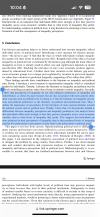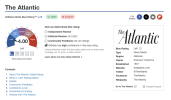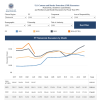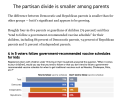I hate to do this but your economist is wrong and making false arguments.
Again, I don't hate you bringing up a difference in opinion, discussing is a better option.
Annexing France and bringing in immigrants is not the same thing. The French have jobs while the immigrants crossing the border do not.
So you're saying all the illegal immigrants do not have jobs in the countries they are from?
If they don't, what skill do they bring with them over the border? Or what % of these illegal immigrants have advanced education? Bringing skills that are needed in America at this time?
The immigrants increase the pool of labor. The concerns over draining our social service safety nets is valid, and the concerns over lowering wages too is valid, however this is an overriding effect at play. When the economy turns bad, the party in power loses the election. The fight against inflation is the fight to maintain power.
The concept motivating the Biden administration to keep the southern border open despite the polling showing it to be unpopular is referred to as NAIRU.
This series provides short, concise explanations for various economics topics.

www.rba.gov.au
The Biden Administration has signaled an intention to close the border right before the election so as to take the issue off the table for voters, but they are going to do everything they can to keep it open to flood the pool of labor right up until the last minute. Yes, it will cause problems in society but the economy will be healthy and inflation will be contained which should help the democrats hold on to power.
Illegal immigration is putting financial pressure on low to moderate income levels. This is where cracks in the economy are starting to appear.
Lets take a look at what is happening for lower income level earners:
Most people across income groups report financial stress from recent high inflation. To cope, individuals with lower incomes have cut back on necessities.

www.stlouisfed.org
Low- and Moderate-Income Households Cut Back on Necessities
When confronted with less purchasing power, individuals relied on different responses to cope. Based on the Household Pulse Survey results in June 2023, a majority of individuals across all household income groups used three strategies:
- Shopped at stores that offered lower prices, looked for sales and/or used coupons
- Ate at restaurants or ordered food for delivery less often
- Delayed major purchases
Beyond those common or shared tactics, there were more nuanced findings based on household income. As a combined group, low- and moderate-income individuals more frequently used the following tactics (in order of prevalence):
- Switched from name-brand products to generic options
- Contributed less to savings and/or retirement accounts
- Drove less or changed modes of transportation (e.g., biked or took public transportation instead of driving)
- Delayed medical treatment (e.g., refilling prescriptions, having surgery)
- Increased use of credit cards, loans and/or pawnshops
- Worked additional job(s)/shift(s) to supplement income
Some coping strategies were used significantly more by (but were not limited to) individuals with lower household incomes:
- Purchased less meat and/or fresh produce
- Decreased use of utilities (e.g., cooling, heating, water, electricity)
- Asked friends and/or family for help
- Utilized benefits from charities
Less consumption or Debt is the only option.
Americans held more than $1.05 trillion on their credit cards in the third quarter of 2023.

apnews.com
"But for the
rest of America, things are looking rough.
“You have these noticeable pockets of consumers -- mostly middle- and lower-income renters who have not benefitted from the wealth effect of higher housing prices and stock prices -- who are feeling financial stress and that’s driving up these delinquency levels. They’ve been hit very hard by inflation,” said Warren Kornfeld, a senior vice president at Moody’s, in an interview.
Kornfeld, who co-wrote a report last week looking at the climbing levels of delinquencies, expects them to keep climbing this year."
Again the people who make 100k+ are seeing some stress but not at the levels of lower earners.
Illegal immigration is hurting this these Americans the hardest. Taking away opportunities for wage increase is a huge factor. Housing is another huge issue. Lets look at rents in the USA last year.
Asking rents were up 3.5% in February 2025 compared to the same time last year, according to Zillow’s latest rental report.

www.nerdwallet.com
"Rent prices are now 29.4% higher than they were before the pandemic, but rental growth seems to have slowed from the major spikes of 2021. In January, rents are 3.4% higher than at the same time last year."
"More income is required to rent. A person needed to make $78,304 a year to afford rent in January — paying about 30% of income. That’s an increase of 29% since before the pandemic."
63% of American Households are in the low to moderate wage earners. And 50% of American households do not make $78,304 to afford rent.
I do care about Americans who are really struggling and how policies should go to benefit Americans as priority One. We do not have unlimited resources for the whole world to have and use for their problems.










